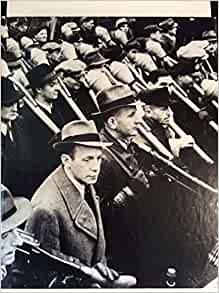Welcome to THE MAKING OF A NATION – American history in VOA Special English. I'm Steve Ember. The United States entered the Second World War in December of forty-one. Europe had already been at war since nineteen thirty-nine. But the United States did not enter World War Two until Japanese forces attacked the American naval base at Pearl Harbor, Hawaii. The attack was a surprise. But American military and political leaders had believed that the United States, sooner or later, would be pulled into the fighting. And they began to prepare for war. President Franklin Roosevelt had been assistant secretary of the Navy under President Woodrow Wilson during World War One. He remembered how American troops were not ready for that war. Now that he was president, Roosevelt wanted to be sure that the United States would be ready when it had to fight. Throughout nineteen forty-one, Roosevelt urged American industries to produce more weapons and other military supplies. He established new government agencies to work with industry to increase arms production.
Some business leaders resisted Roosevelt's efforts. They felt there was no need to produce more arms while the United States was still at peace. But many others cooperated. And by the time Japan attacked Pearl Harbor, the American economy was producing millions of guns and other weapons. Still, this was not enough to fight a war. After the Japanese attack, Roosevelt increased his demands on American industry. He called for sixty thousand warplanes, forty-five thousand tanks and twenty-thousand anti-aircraft guns. And he wanted all these within one year. A month after the Pearl Harbor raid, Roosevelt organized a special committee to direct military production. He created another group to help companies find men and women for defense work. And he established a new office where the nation's best scientists and engineers could work together to design new weapons. These new government organizations faced several problems. Sometimes factories produced too much of one product and not enough of another. Sometimes tools broke. And some business owners refused to accept government orders.

But the weapons were produced, and American troops soon had the guns and supplies they needed. The federal government had to quickly expand its own workforce to meet war needs. Federal spending increased from six billion dollars in nineteen forty to eighty-nine billion in nineteen forty-four. That was fifteen times as much spending in just five years. Roosevelt had to take strong steps to get the money for all this spending. He put limits on wages. He increased income taxes to as much as ninety-four percent on portions of incomes over two hundred thousand dollars. And he asked the American people to lend money to the federal government. The people answered by purchasing almost one hundred billion dollars in war bonds. The great increase in public spending raised the threat of high inflation. Roosevelt created a special office with the power to control prices. Many Americans agreed with the idea of price controls. But every business wanted somebody else's prices controlled, not their own.
Federal officials had to work hard to keep prices and supplies under control. They restricted how much meat, fuel and other goods people could buy. The price control program generally worked. Its success kept the American economy strong to support the troops fighting in Europe and Asia. One reason these strong economic steps worked was because most of the American people fully supported the war effort. You can look at photographs of people from those times and see in their faces how strongly they felt. In one picture from the state of North Carolina, a group of men are standing in front of old rubber tires. They are planning to give the tires to the Army to be fixed and used for military vehicles. Another photo shows a woman visiting a hospital. She is singing to a soldier to lift his spirits. Still another photo shows a man who owns a small food store. He is placing signs on meat and cans of food to tell people how much they are allowed to buy. You can also get an idea about the feelings of the times by the names of some of the popular songs during World War Two. In addition to "Rosie the Riveter," there were songs like "Praise the Lord and Pass the Ammunition." One of the most hopeful songs was this one, recorded by Britain's Vera Lynn.













